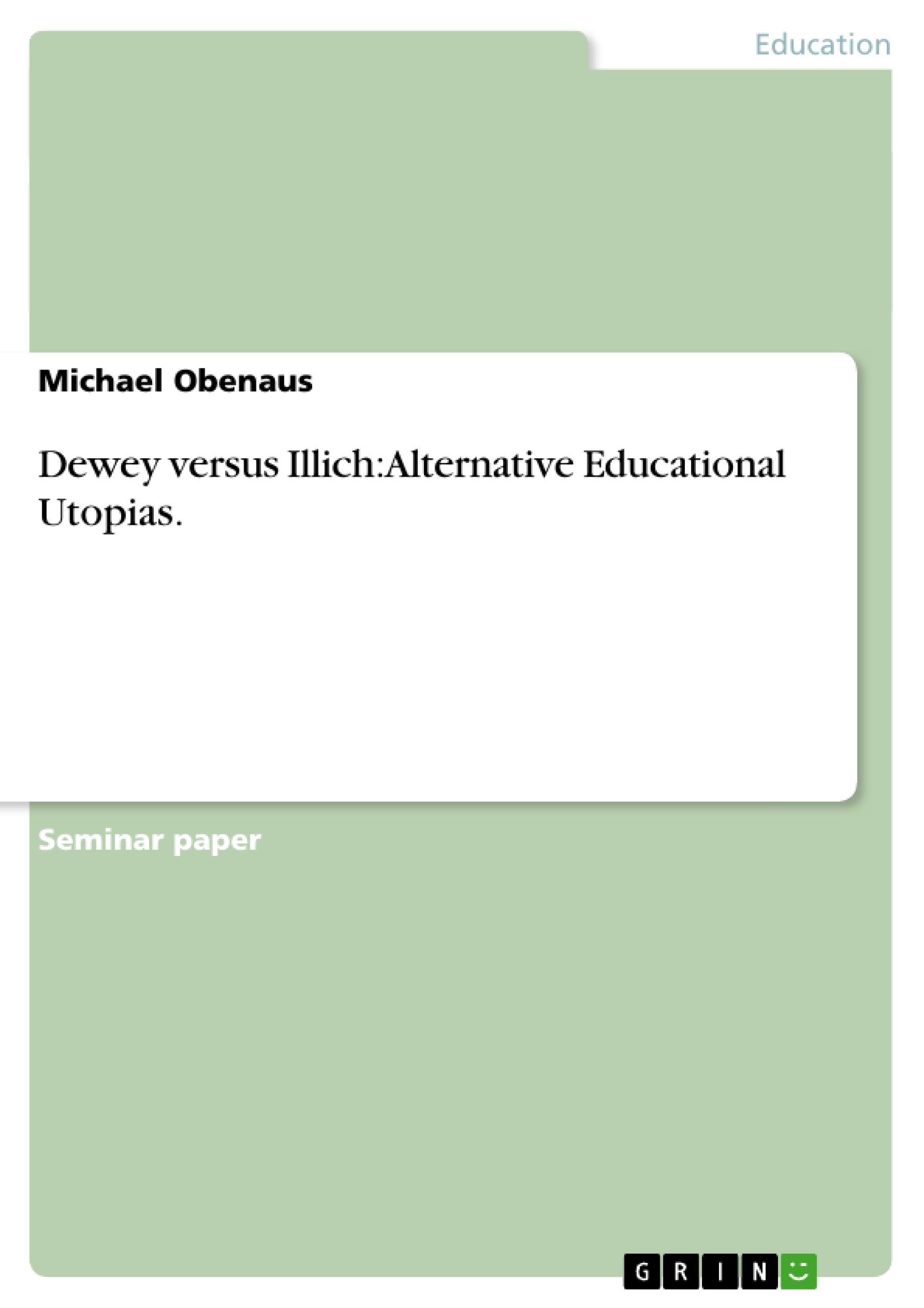In this paper I want to discuss two major educational theories which both had and still have an enormous impact on educational theory and practice all over the world. Looking at the American 19 th / 20 th century philosopher and educational reformer John Dewey, and at Ivan Illich, a radical educationalist of the late 20 th century, I want to focus on the concepts of socialisation underlying their theories. While John Dewey attempted to reform school so as to make possible “true education in a democratic sense, Ivan Illich promoted an educational revolution with “de-schooling as only one form of de- institutionalising society. A
comparison of these two diametrically opposed approaches towards education will be followed by pointing out where, and how far, they have found their way into educational policies and systems of our days. This will provide insight into the understanding of
socialisation as it is manifested in nowadays’ schooling systems in Western Europe, especially in Scotland (Great Britain) .
Inhaltsverzeichnis (Table of Contents)
- INTRODUCTION
- JOHN DEWEY
- EDUCATIONAL THEORY
- SOCIALISATION FOR DEMOCRACY
- IVAN ILLICH
- DESCHOOLING SOCIETY
- SOCIALISATION FOR AUTONOMY
- EDUCATION IN SCOTLAND TODAY
- ISSUES IN EDUCATION
- EDUCATIONAL SITES AND PROVISIONS
- Primary Education
- Secondary Education
- Further and Higher Education
- Alternative Educational Provisions
Zielsetzung und Themenschwerpunkte (Objectives and Key Themes)
This paper compares the educational theories of John Dewey and Ivan Illich, focusing on their concepts of socialization and how these ideas relate to modern educational policies, particularly in Scotland. The paper aims to provide insight into how socialization is manifested in contemporary schooling systems.
- Socialization in educational theories
- Democratic education
- De-schooling and alternative education
- Educational reform and policy
- Socialization in contemporary schooling systems
Zusammenfassung der Kapitel (Chapter Summaries)
- Introduction: Introduces the paper's focus on comparing Dewey and Illich's educational theories and their relevance to contemporary educational policies, particularly in Scotland.
- John Dewey: Discusses Dewey's educational theory, which emphasizes a democratic and egalitarian approach to education, aiming to form critical, autonomous, and democratic members of society. It explores Dewey's concepts of education as a social function, direction, and growth.
- Ivan Illich: Examines Illich's radical educational ideas, particularly his concept of "deschooling" society, which challenges traditional institutions and promotes alternative forms of learning and socialization.
- Education in Scotland Today: Analyzes the current state of education in Scotland, exploring issues in education and examining various educational sites and provisions, including primary, secondary, further, higher, and alternative education.
Schlüsselwörter (Keywords)
This paper explores key concepts such as socialization, democracy, education, deschooling, alternative education, educational reform, educational policy, and contemporary schooling systems. The focus is on the comparison of Dewey and Illich's educational theories and their relevance to modern educational practices, particularly in Scotland.
Frequently Asked Questions
What is the main difference between Dewey's and Illich's educational theories?
John Dewey focused on reforming schools to foster democracy, while Ivan Illich advocated for a radical "de-schooling" of society and de-institutionalizing education altogether.
What does Ivan Illich mean by "deschooling society"?
Illich argued that traditional school systems are restrictive institutions; he promoted an educational revolution where learning happens through informal, autonomous social networks.
How did John Dewey view the role of education in a democracy?
Dewey believed education is a social function that should develop critical, autonomous individuals capable of participating effectively in a democratic society.
Which modern education system is used as a case study in this paper?
The paper examines how these theories manifest in the contemporary schooling systems of Western Europe, specifically in Scotland, Great Britain.
What are the key themes of socialization discussed in the text?
The text explores socialization for democracy (Dewey) versus socialization for autonomy (Illich) and how these concepts influence current educational policies.
What types of education in Scotland are analyzed in the paper?
The analysis covers primary, secondary, further, and higher education, as well as alternative educational provisions in Scotland.
- Citation du texte
- Michael Obenaus (Auteur), 2000, Dewey versus Illich: Alternative Educational Utopias., Munich, GRIN Verlag, https://www.grin.com/document/23536



